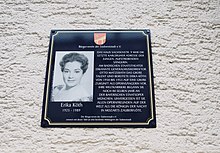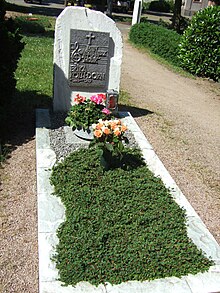Erika Koeth
Erika Köth (born September 15, 1925 in Darmstadt , † February 20, 1989 in Speyer ) was a German opera singer ( soprano ). With her coloratura soprano, she was in Mozart - operas famous, especially as Queen of the Night in The Magic Flute . She also achieved widespread recognition through roles in operas and operettas by Albert Lortzing , Robert Stolz , Johann Strauss and Franz Lehár . She was one of the great coloratura sopranos of the 20th century in Germany. Her voice was characterized by "highest virtuosity, exquisite sound beauty and special luminosity in the highest registers" (Herrmann / Hollaender 2007, p. 35).
Life
Erika Köth fell ill with polio at the age of eight, from which she largely recovered after lengthy therapy. At the age of 17 she received a scholarship from her hometown, but the war prevented her career as a singer and she ended up in an ammunition factory instead of the theater. After the end of the war, Erika Köth earned her living as a pop singer for the American army and studied singing at the Darmstadt Academy for Music .
In 1947, out of 300 applicants, she won a Radio Frankfurt singing competition with the aria of the Queen of the Night . She then got her first engagement at the Pfalztheater in Kaiserslautern, where she made her debut in 1948.
Around 1950 she met her future husband on the football field, the actor and director Ernst Dorn, who later also managed her. In addition, she received an engagement at the Badisches Staatstheater in Karlsruhe, under the direction of General Music Director Otto Matzerath . The three years at the Karlsruhe Theater were decisive for her career as a celebrated coloratura soprano . Looking back on her time in Karlsruhe, the artist said: "That was my best time, when I was so poor and never had money ... I owe everything to Otto Matzerath in Karlsruhe."
In 1953 Köth moved to the Bavarian State Opera in Munich, to whose ensemble she belonged until 1978. In the state capital of Bavaria she had one of her first successes as Lucia di Lammermoor . There were her singing partners Sári Barabás , Hertha Töpper , Lilian Benningsen , Hans Hotter as well as Fritz Wunderlich and Hermann Prey .
Erika Köth also appeared regularly in productions at the Hamburg and Vienna State Operas . She also worked at the State Theater on Gärtnerplatz . Erika Köth sang the Queen of the Night in Mozart's Magic Flute over 270 times , including in 1953 at the Vienna State Opera and 1956 at La Scala in Milan . In 1960 she became a member of the Deutsche Oper Berlin and expanded her repertoire into the lyric field : roles such as Mimi, Antonia, Liù and Micaela were added as new roles. From 1955 to 1960 and 1962/1963 Erika Köth sang at the Salzburg Festival . In 1958 she toured the USA, in 1961 a tour of the Soviet Union and in 1963, 1966 and 1971 through Japan, a. a. with the operas Le nozze di Figaro , Die Zauberflöte and Falstaff . She took part in three films and in 1958 she was the leading actress at Wolf Albach-Retty's side in My whole heart is full of music . In it she played a woman who led a strange double life.
At the Bayreuth Festival Erika Köth sang the role of the forest bird in Richard Wagner's Siegfried . Further appearances followed in Covent Garden in London , in Rome, Los Angeles, San Francisco and Budapest, mainly in Richard Strauss roles. She also sang Lucia di Lammermoor and Mimi in Puccini's La Bohème .
Her last much acclaimed performance on an opera stage was in Munich in 1978 as Mimi in Puccini's La Bohème . She then worked as a lecturer at the music academies in Cologne and Mannheim until 1988 , gave masterclasses in Neustadt an der Weinstrasse , where she lived, and was also involved with August Everding's “Singschul” in Munich. Her students included Anna Maria Kaufmann and Ruth Frenk .
Apart from the opera stage, she was also a few times a guest on the television program Zum Blauen Bock with Heinz Schenk . Here she sang songs of the easy muse.
In 1989 the artist succumbed to cancer. On February 23, 1989 she was buried in the old cemetery (grave site: 1 A 121) in Darmstadt by the bishop of the Speyer diocese, Anton Schlembach . The funeral speech was given by the former Prime Minister of Rhineland-Palatinate, Bernhard Vogel .
In Darmstadt, Baldham near Munich and Neustadt an der Weinstrasse streets were named after Erika Köth.
Erika Köth chain
The Foundation for the Promotion of the Semperoper in Dresden awards the Erika Köth chain to outstanding singers at irregular intervals . So far Birgit Fandrey (1994) and Christiane Hossfeld (2001) have received this award.
Discography (selection)
- Abduction from the Seraglio (Opera, WAMozart), complete recording, 1965, under Eugen Jochum ; as Constanze
- Die Walküre (Opera, R. Wagner), complete recording, 1954, under Wilhelm Furtwängler ; as Helmwige
- Siegfried (Opera, R. Wagner), complete recording, Bayreuth Festival 1966 (live), under Karl Böhm ; as the voice of the forest bird
- Bandit pranks (operetta, F. von Suppè) complete recording
- Rigoletto (Opera, G.Verdi), cross-section , with Rudolf Schock
- Lucia di Lammermoor (Opera, G.Donizetti), cross section, with Rudolf Schock
- Don Pasquale (Opera, G.Donizetti), cross section, with Josef Traxel
- The bird dealer (operetta, C.Zeller), cross section, with Rudolf Schock
- Erika Köth sings arias by Wolfgang Amadeus Mozart
- Erika Koeth. portrait
- German folk songs
- Erika Köth in her favorite roles
Filmography
- 1955: a heart full of music
- 1955: Mozart (guest appearance as Queen of the Night )
- 1958: My whole heart is full of music
Honors
- 1975: Cross of Merit 1st Class of the Federal Republic of Germany
- Bavarian Order of Merit
- Order of Merit of the State of Rhineland-Palatinate
- Large Federal Cross of Merit
- Hermann Löns Medal
literature
- Karl-Josef Kutsch , Leo Riemens : Large singer lexicon . First volume: A-L . Francke, Stuttgart et al. 1987, ISBN 3-317-01638-8 .
- Walter Herrmann, Adrian Hollaender : Legends and Stars of the Opera. From Gigli to Callas to Domingo and Netrebko . Leykam, Graz 2007, ISBN 978-3-7011-7571-0 .
Web links
- Literature by and about Erika Köth in the catalog of the German National Library
- http://www.vinyldivas.com/koeth.htm
- Erika Köth in the Munzinger archive ( beginning of article freely accessible)
- Entry on Erika Köth in the Rhineland-Palatinate personal database
- Erika Köth in the Bavarian Musicians' Lexicon Online (BMLO)
Remarks
- ↑ In some music dictionaries, 1927 is mentioned as the year of birth.
| personal data | |
|---|---|
| SURNAME | Koeth, Erika |
| BRIEF DESCRIPTION | German opera singer (soprano) |
| DATE OF BIRTH | September 15, 1925 |
| PLACE OF BIRTH | Darmstadt |
| DATE OF DEATH | February 20, 1989 |
| Place of death | Speyer |

